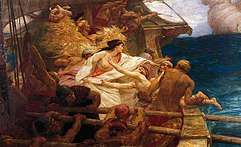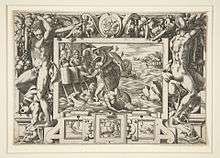Absyrtus

In Greek mythology, Absyrtus (Ancient Greek: Ἄψυρτος) or Apsyrtus, was a Colchian prince.
Family
Absyrtus was the son of Aeëtes, king of Colchis and a brother of Medea and Chalciope. His mother is variously given: Hyginus calls her Ipsia,[1] Hesiod and the Bibliotheca call her Idyia,[2] Apollonius calls her Asterodeia, a Caucasian Oceanid[3] and others Hecate[4][5], the Nereid Neaera[6][7] or Eurylyte[8][9].
A tradition followed by Pacuvius,[10] Justin,[11] and Diodorus,[12] provided Aegialeus as the name of the son of Aeëtes who was murdered by Medea.[13]
| Relation | Name | Source | ||||||||||||||
|---|---|---|---|---|---|---|---|---|---|---|---|---|---|---|---|---|
| Naupactica | Soph. | (Sch. on) Apollon. | Pacuvius | Diodorus | Cicero | Valerius | Strabo | Pliny | Apollod. | (Sch. on) Hyginus | Lucian | Aelian | Justin | Orph. Argo. | ||
| Absyrtus | √ | √ | √ | √ | √ | √ | ||||||||||
| Aegialeus | √ | √ | √ | √ | ||||||||||||
| Apsyrtus | √ | √ | ||||||||||||||
| Parentage | Aeetes and Eurylyte | √ | √ | |||||||||||||
| Aeetes and Neaera | √ | √ | ||||||||||||||
| Aeetes and Asterodeia | √ | |||||||||||||||
| Aeetes and Hecate | √ | √ | ||||||||||||||
| Aeetes and Idyia | √ | √ | ||||||||||||||
| Aeetes and Ipsia | √ | |||||||||||||||
| Aeetes | √ | √ | ||||||||||||||
| Siblings | Medea | √[14] | √[14] | √ | √ | √ | √ | √ | √ | √ | √ | √ | ||||
| Chalciope | √ | √ | √ | √ | √ | |||||||||||
| Circe | √ | |||||||||||||||
Mythology


When Medea fled with Jason, she took her brother Absyrtus with her, and when she was nearly overtaken by her father, she murdered her brother, cut his body into pieces and strewed them on the road, so that her father might thus be delayed by gathering the limbs of his child. Tomi, the place where this occurred, was believed to have derived its name from temno (τέμνω, "cut").[15]
According to another tradition, Absyrtus was not taken by Medea, but was sent out by his father in pursuit of her. He overtook her in Corcyra, where she had been kindly received by King Alcinous, who refused to surrender her to Absyrtus. When he overtook her a second time in the island of Minerva, he was slain by Jason.[16] Apollonius of Rhodes presents a variation on this tradition in Argonautica (Book 4): Jason murdered Medea's brother on one of the "Brygean Islands" (an island sacred to the goddess Artemis and located in the modern Kvarner Gulf), where he was lured by Medea with false promises – their first (and last) meeting after leaving Colchis.
References
- ↑ Scholia on Hyginus. Fabulae, 23
- ↑ Pseudo-Apollodorus, Bibliotheca 1. 9. §23.
- ↑ Apollonius of Rhodes, 3. 241.
- ↑ Diodorus Siculus. Bibliotheca historica, 4.45.1
- ↑ Preston's note to Apollonius of Rhodes, Argonautica 3.330 "Asterodea" (p. 168) quoting "Dionysius, the Milesian, says that Hecate was the mother of Medea and Circe"
- ↑ Scholia on Apollonius Rhodius, Argonautica, 3. 242
- ↑ Preston's note to Apollonius of Rhodes, Argonautica 3.330 "Asterodea" (p. 168) quoting "Sophocles assigns them, as their parent, Neera, one of the Nereids" & "Now in his hands" (p. 269) quoting "In his Scythians, Sophocles says, that Absyrtus was not the uterine brother of Medea : they were not the offspring of one bed; the youth was newly sprung from a Nereid.—Eiduia, the daughter of Ocean, bore the virgin. "
- ↑ Scholia on Apollonius Rhodius, Argonautica l.c.
- ↑ Preston's note to Apollonius of Rhodes, Argonautica 3.330 "Asterodea" (p. 168) quoting the name of Aeetes' wife: "The author of the Naupactica calls her Eurylyte".
- ↑ Cicero, De Natura Deorum 3. 19.
- ↑ Junianus Justinus, 42. 3.
- ↑ Diodorus Siculus, 4. 45
- ↑ Schmitz, Leonhard (1849). "Absyrtus". Dictionary of Greek and Roman Biography and Mythology. 1. Boston. pp. 3–4. Archived from the original on 2005-12-31.
- 1 2 Medea was the half-sister of Absyrtus because the maiden's mother was Idyia, the Oceanid while that of the boy was Neera, the Nereid. Compare Preston's note to Apollonius of Rhodes, Argonautica 3.330 "Asterodea" (p. 168) & "Now in his hands" (p. 269)
- ↑ Pseudo-Apollodorus, Bibliotheca 1. 9. §24; Ovid, Tristia 3. 9; compare Apollonius 4. 338, &c. 460, &c.
- ↑ Gaius Julius Hyginus. Fabulae, 23
Sources
